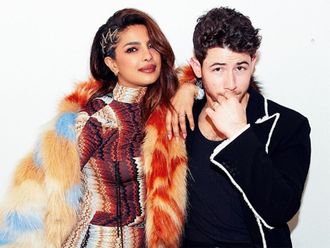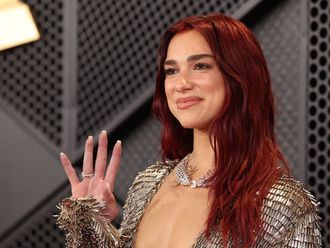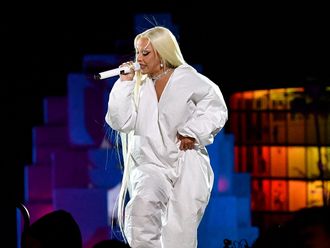In August, Taylor Swift released Look What You Made Me Do, the first single from her new album, Reputation, which finally emerged from its shroud of secrecy on November 10. The track and its subsequent video broke three records within a week, including first-day streaming figures on Spotify and YouTube respectively. Swift’s sixth album has already thrashed pre-sale records, selling more than 400,000 copies — partially due to an industry standard reward system that gives early purchasers exclusive priority access to concert tickets.
These achievements are fairly typical business for Swift, who often finds herself breaking records that were set with her previous release. She has sold more than 33 million albums worldwide, thanks to her reluctance to join Spotify until this summer, keeping her sales robust while most artists have experienced a decline. She and Adele are the only two female artists to win the Grammy for album of the year twice. And her music isn’t the sole draw. Her every heartbeat — her records, relationships and social media activity — is chronicled, inflated, and attributed with a significance far greater than Swift herself.
Given her status and power as one of the world’s biggest pop stars, the vengeful tone of Look What You Made Me Do seemed a little surprising. Swift had stripped away her supernatural gift for melody, replacing it with a sound as hostile as the song’s message. The opulent video referred to her feuds with Kim Kardashian, Kanye West, Katy Perry, the media and, basically, anyone who has ever criticised her. And she wasn’t just going after her peers. Not long after the single’s release, the blog PopFront — which then had 76 Twitter followers and 1,000 Facebook likes — claimed that the song’s antagonistic lyrics “reinforced white anger and white supremacy”. The author suggested Swift should distance herself from her fervent alt-right fanbase, who have interpreted her blond athleticism as an affirmation of Aryan values.
PopFront’s claims were ridiculous — the latest example of the bad faith that dogs Swift — but the chances of anyone reading them were minimal. That is, until Swift’s lawyers threatened to sue PopFront if it didn’t remove them, and the American Civil Liberties Union stepped in to remind Swift about the First Amendment. “Criticism is never pleasant, but a celebrity has to shake it off, even if the critique may damage her reputation,” it wrote in a letter made public on Tuesday.
That Swift would use her muscle to intimidate a blogger, rather than denounce the alt-right, was just the latest example of the famously controlling musician losing grip of the narrative she has worked to maintain throughout her 11-year career. “I’m intimidated by the fear of being average,” she once told the Recording Academy.
Swift’s chosen narrative is, understandably, that she became the world’s biggest pop star because she is talented and hardworking. This is true. She was writing her own songs when she was 11. At 14, she convinced her parents to move from Pennsylvania to Nashville for her career. She knew record execs were wrong when they told her that teenage girls didn’t like country, because she was a teenage girl who was obsessed with country. Her self-titled 2006 debut, released when she was 16, showcased her knack for melody and peaked at No 5 in the US. Her pure yet prematurely wise depictions of teenage love impressed critics, as did the potent vindictive streak (“I’m just sitting here planning my revenge,” went one early lyric) that distinguished her from Disney’s juvenile cohort.
Her 2008 follow-up, Fearless, became the most garlanded country album in history. The 2009 MTV Video Music award for best female video wasn’t the glitziest trophy it won, but by far the most career-defining. As Swift accepted her award, Kanye West arrived suddenly on stage to tell the world that Beyonce’s Single Ladies was the worthy victor. He later explained he had nothing against Swift, but wanted to take a stand against industry racism. Suddenly, Swift’s narrative splintered. What if talent, hard work and her emphasis on moral goodness weren’t the sole reasons for her success? What if her white privilege — which she had unwittingly exploited in her music’s dynamic of innocence and victimhood — gave her an advantage?
Born in 1989, she is a first-generation digital native. By 2009, social media was getting serious, the newly popular Twitter a crucible of debate on privilege — racial, social, financial — and the “right” way to be a feminist. West and Swift’s moment at the VMAs was kindling for the furnace.
The VMAs moment turned Swift into a lightning rod for debates around feminism, race and politics. It also taught her how to turn controversy to her favour, playing aggressor, victim and leader as it suited her best. She learned how to play the gossip cycle with 2010’s album Speak Now, dropping hints about the ex-boyfriends and nemeses it concerned. On 2012’s Red, she stepped into pop, which allowed her to express her sexuality, flex her songwriting craft and, naturally, sell bucketloads: more than 6 million copies worldwide.
Swift’s references to exes Jake Gyllenhaal and Conor Kennedy (signposted via clues in the liner notes) gave her a reputation for being boy-crazy. Whether this perception was her doing or that of the press, she capitalised on it with 2014’s 1989, which marked another reinvention.
The second aspect of Swift’s transformation was her feminist awakening. But her actual remarks about feminism remained limited. Her “squad” — a group of models and singers who joined her for sleepovers and on stage — became a byword for showy exclusivity. When Swift marshalled her troops in the video for Bad Blood, a diss track about Katy Perry supposedly “stealing” her dancers, it highlighted the darker side of this allegiance.
She blundered when she interpreted Nicki Minaj’s comments on the certainty of thin, white women triumphing at the 2015 MTV VMAs as an attack. Minaj set Swift straight, but implored her to “speak on this” — the racial dynamics Kanye West had attempted to highlight. She didn’t. Swift’s predominantly white squad, and employment of black dancers’ bodies in the video for Shake It Off, had been noted, as had her silence on Black Lives Matter.
The picture didn’t improve in 2016. Kanye West released the song Famous, including the lyric, “I feel like me and Taylor might still have sex/Why? I made that [expletive] famous,” and an argument ensued, between Swift and West’s wife, Kim Kardashian, about whether Swift had consented to the use of the lyric. Then there was a relationship with Tom Hiddleston, which played out in absurd scenes in public: smoochy beach photo ops, plus Hiddleston wearing an “I [HEART] TS” vest at her July 4 party. She ignored calls to endorse Hillary Clinton for president, and to denounce Donald Trump, her silence making her unwittingly synonymous, in many minds, with the 53 per cent of white women voters who cast their ballot for Trump.
Swift’s personal righteousness — and her bottom line — appeared to outweigh her concerns about social justice. In August, Swift returned to the spotlight when she won a sexual assault case against a DJ who had groped her at a meet-and-greet. Her testimony was razor-sharp. She acknowledged the privilege that enabled her to pursue the case, and promised to support other organisations providing such resources to less fortunate victims. For a moment, she was a feminist hero.
But then she released the vindictive Look What You Made Me Do, finally unleashing her long-simmering rage.
She has always been perfectly attuned to the cultural moment: mirroring the mainstreaming of feminism, then the fallout from urgent discussions about identity and privilege. There are also convincing arguments that her partial fall from grace reflects the way whiteness is being decentred in pop culture. Swift spent a decade trying to show that she is just like us, desperately concealing her darker impulses. Now she has stopped bothering. Reputation may be ugly and myopic in places — making Swift no less in tune with the times than usual.













